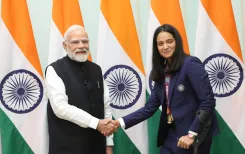How Did Vande Mataram Ignite India's Freedom Spirit?

Synopsis
Key Takeaways
- Vande Mataram is a symbol of India's struggle for independence.
- The song continues to inspire national pride today.
- It promotes the idea of unity above caste and religion.
- Composed by Bankim Chandra Chatterjee in 1875.
- Recognized as the national song in 1950.
Lucknow, Nov 7 (NationPress) Uttar Pradesh Chief Minister Yogi Adityanath stated on Friday that Vande Mataram was instrumental in stirring the spirit of nationalism and charting a new course for India during its struggle for freedom, and it continues to motivate the nation today.
During a ceremony held at Lok Bhavan to commemorate the 150th anniversary of Vande Mataram, the Chief Minister mentioned that on this significant occasion, Prime Minister Narendra Modi has encouraged citizens to celebrate this day as a 'Smiriti Diwas' of national pride.
The event commenced with a collective rendition of the national song followed by a commitment to promote Swadeshi.
CM Yogi honored Bankim Chandra Chatterjee, the composer of the national anthem, with floral tributes and explored an exhibition organized for this milestone.
Participants were also able to view a live broadcast of the Ministry of Culture's program featuring PM Modi.
“Vande Mataram emerged as the timeless mantra of India's quest for independence. Despite the hardships imposed by colonial rule, the melody resonated through villages and towns, awakening the collective consciousness of India. Freedom fighters and revolutionaries adopted it as their source of inspiration,” the Chief Minister remarked.
Reflecting on the pandemic that afflicted India a century ago, the CM noted that the nation, then home to 30 crore people, lost millions.
“Complete villages were devastated. The world encountered another pandemic in independent India with Covid-19. Throughout this crisis, whether in governance or administration, everyone united with a singular purpose — to confront the challenge,” he stated.
CM Yogi emphasized that Vande Mataram, written in 1875, transcended mere song status; it functioned as a transformative force, instilling the mantra of freedom in the hearts of Indians.
“Though it was composed in a mix of Sanskrit and Bengali, it became an everlasting national sentiment that united India in devotion to the Motherland,” he added.
Discussing the Partition of Bengal in 1905, he highlighted how the song united Indians in their struggle.
“Whenever a revolutionary faced execution, the mantra of Vande Mataram would resonate from their lips. Throughout the freedom struggle, it became the voice of the nation, transcending caste, creed, and religion, and fostering the sentiment of ‘Nation First’,” asserted the CM.
He mentioned that the Constituent Assembly acknowledged Vande Mataram as the national song in 1950. He further added that the song encapsulated the plight of people fighting against hunger and famine, which eventually evolved into a movement for independence.
Quoting PM Modi, Yogi remarked: “We often discuss rights, but do we remember our responsibilities? Our duties should secure the future for current and upcoming generations. Vande Mataram binds us to the Motherland, and the progress Uttar Pradesh has achieved over the last eight years reflects this sense of duty.”








